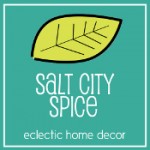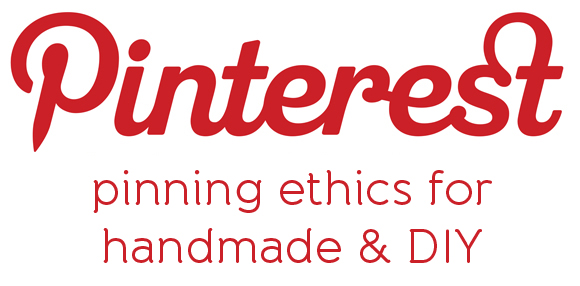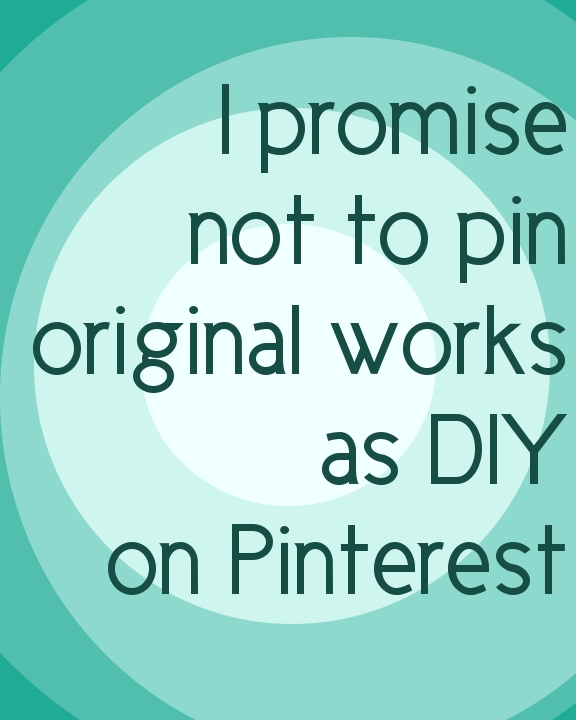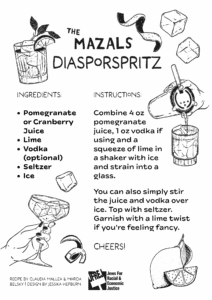Editor’s note: I invited Katrina Zepp of Salt City Spice to come and share her thoughts on pinning original works as DIY projects on Pinterest after reading her post-there are many differing opinions on this topic and I hope we can meet up in the comments to share our thoughts and ideas. See you there!
{Pinterest logo via here}
A few years ago, my husband and I were in the middle of renovating our entire house from top to bottom and I was stuffed full of ideas. I made notes, cut out photos from magazines, and collected paint chips, fabric swatches, and other odds & ends to help remind me of the mood I wanted in each room. I kept these little bits of inspiration in a special binder dedicated to our projects and referred to it constantly. Back in the olden days (i.e., 2008), this was probably pretty standard.
Now? As I start to generate ideas for the kitchen overhaul we hope to complete next year, I wouldn’t even think of using a clunky binder, because there’s a much better way – Pinterest. In case you aren’t familiar, Pinterest allows you to visually bookmark images from nearly any website and arrange your finds onto virtual style boards, sharing your “pins” with others along the way. It’s an endless stream of pretty, and really, who couldn’t use a little Pinspiration?
As with any type of media that encourages users to openly share ideas and content in a public forum, however, there’s also the question of ethics. The issue?
Etsy sellers are finding their handmade works pinned as “DIY” where the pinners clearly intend to make a replica of the original item themselves.
To be clear, the DIY pins in question are not links to tutorials and there isn’t a note that the pinner will be reinventing the item to create something new. In fact, in some instances, the pinner is explicitly clear that they intend to copy the item exactly. This isn’t inspiration; it’s a very public notice that someone intends to replicate an original idea or design. Regardless of the legality, is it ethical to link to a handmade item available for sale and publicly announce you’re going to make yourself?
To me, ethical pinning means generating responsible content that takes into account the original source along with the intent of the idea or item in question. Lately, before pinning, I’ve been following what I like to think of as The Golden Rules of Pinterest:
- I won’t pin, tag, or imply that original works by Etsy sellers are DIY projects.
- I check sources (by clicking the photo until it takes me back to the host site) – I won’t repin potential DIYs from others without first fully investigating the original source.
This is undoubtedly a sticky subject and a correlation to the ongoing discussion about inspiration versus synchronicity versus copying and the idea that nothing is ever really new… except maybe the methods we use to organize and share our ideas.
So where do you stand? Have you ever found your handmade item pinned as a DIY project? Do you check the original source of your pins? Will you take the Pinterest Pledge by pinning the above image to one or more of your Pinterest boards? I’m looking forward to hearing your thoughts in the comments!
 Katrina Zepp is the owner and creative force behind Salt City Spice, specializing in eclectic home decor. She’s a food enthusiast and enjoys sharing her latest culinary creations with her husband and toddling daughter.
Katrina Zepp is the owner and creative force behind Salt City Spice, specializing in eclectic home decor. She’s a food enthusiast and enjoys sharing her latest culinary creations with her husband and toddling daughter.
Shop: http://www.etsy.com/shop/saltcityspice
Twitter: http://twitter.com/#!/saltcityspice
Blog: http://saltcityspice.blogspot.com/



